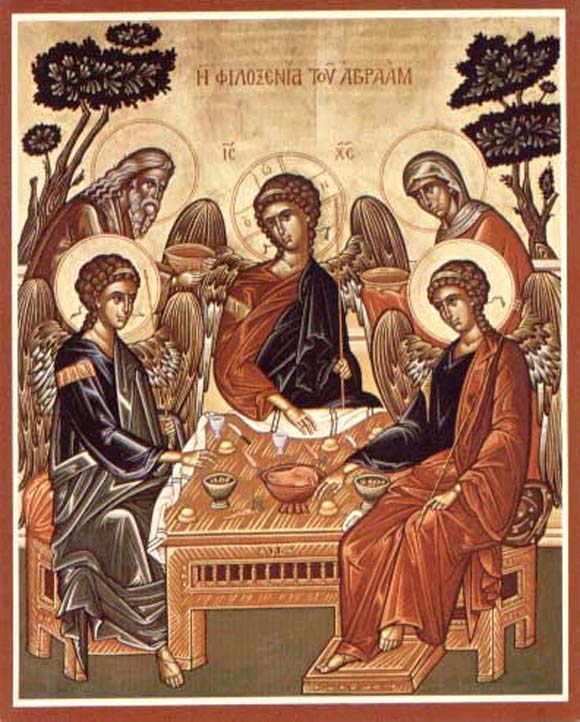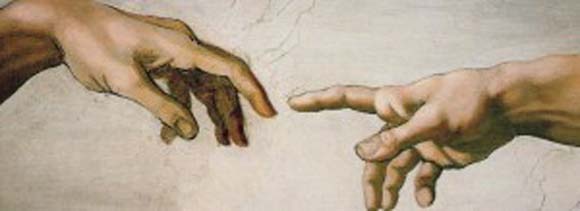
Sacraments: The Sacraments in General
2.03k
 We live in a world of signs: the coloured lamps of a traffic light, the flags which identify nations and the complex cluster of laundry symbols in the label of a jumper are all physical things, perceived by the senses, which penetrate beyond the senses, to communicate something to the mind. In the medical world, an empirically identifiable ‘sign’ – pointing beyond itself to the hidden existence of an illness – is differentiated from the subjectively reported but otherwise invisible ‘symptom’.
We live in a world of signs: the coloured lamps of a traffic light, the flags which identify nations and the complex cluster of laundry symbols in the label of a jumper are all physical things, perceived by the senses, which penetrate beyond the senses, to communicate something to the mind. In the medical world, an empirically identifiable ‘sign’ – pointing beyond itself to the hidden existence of an illness – is differentiated from the subjectively reported but otherwise invisible ‘symptom’. The Sacraments of the Church belong to the order of signs, because they are physical realities that point to a hidden spiritual reality that they ‘contain’. The seven Sacraments of the Church, instituted by Jesus Christ, are not merely human signs however, but signs of the ever-creative Word of God: they not only signify meaning, but they actually accomplish what they signify, penetrating not only the human intellect, but also the will, to the very depths of our being. The things of the natural world which signify God’s presence, and the rites of the Old Testament, are ‘sacraments’ insofar as they point to God, but they lack the supernatural causal power to effect grace that characterises the Sacraments of the Church.
As signs instituted by God to communicate grace to man, the physical aspects of the Sacraments are determined by God, and cannot be the subject of arbitrary human determination. Certainly, there is a time for creative expression, but signs that have constantly shifting meanings cease to be reliable as means of communication, and therefore fail in their mission. The sacraments are divine – and therefore perfect – signs, and thus the material of the sign (the water of baptism, or the oil of confirmation, for example) is joined to a consecrated form of words, which refines and perfects the natural symbolism of the matter, revealing its signification – and thus the grace it effects – beyond doubt.
As the Sacraments are instituted to communicate grace – to incorporate us into Christ by the gift of sanctifying grace – the sacraments are elevated by God to become causes of grace. For this reason, St Augustine rigorously opposed the heretical view of the Donatists that sacraments celebrated by wicked ministers were invalid and in need of repetition. The ‘power’ of the sacraments to communicate grace does not depend upon the moral character of the minister, but upon the power and glory of God and the merits of Christ’s paschal victory. The subjective disposition of the minister or recipient is not the cause of grace, therefore, but grace is communicated by the power of the completed sacramental rite, or – in scholastic terminology – ex opere operato. It is, of course, possible to interpose the obstacle of mortal sin to the flowering of grace within the soul, but this does not compromise the objective efficacy of the sacramental rite performed.
Some theologians of the reformation alleged that by seemingly giving the (albeit sacred) activities of man a quasi-divine power to communicate grace, we had fallen into the other great heresy that St Augustine fought, that of Pelagianism, which saw salvific value in purely human activity. It is, however, Christ Himself who presides as High Priest at every sacramental celebration. God always respects the freedom of man, and so the human minister never loses his authentic causal relationship to the world, but serves only as a subordinate and instrumental cause of grace: the priest at Mass is an instrument deployed by the Sacred Humanity of Christ, one who God ‘causes to be a cause’ without loss of freedom.
 Different causes produce different effects, and therefore the existence of seven sacraments points to the diversity of work done by them. The work of sanctification done by each of the sacraments, by the conferral of sanctifying grace, is one and the same, but each sacrament also addresses a particular human need by a particular effect of ‘sacramental grace’. Together the sacraments form a coherent system for the communication of the merits of Christ’s death and resurrection, known as the sacramental economy. This sacramental economy is the opening of the inner life of the triune God to humanity, offering to us the possibility of participating in the very life of the Godhead.
Different causes produce different effects, and therefore the existence of seven sacraments points to the diversity of work done by them. The work of sanctification done by each of the sacraments, by the conferral of sanctifying grace, is one and the same, but each sacrament also addresses a particular human need by a particular effect of ‘sacramental grace’. Together the sacraments form a coherent system for the communication of the merits of Christ’s death and resurrection, known as the sacramental economy. This sacramental economy is the opening of the inner life of the triune God to humanity, offering to us the possibility of participating in the very life of the Godhead.


